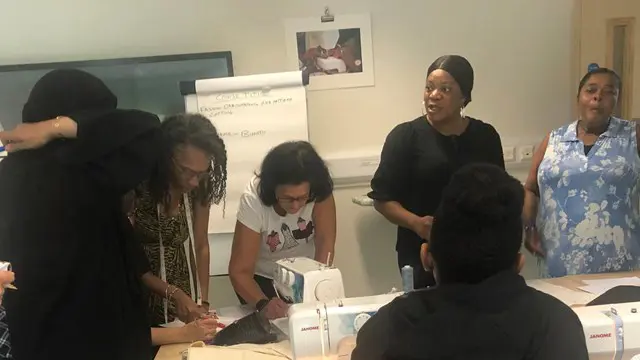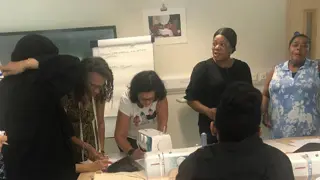
Cloth Making For Beginners Every Saturdays Time : 11am to 1:00pm
Dressmaking Classes
African Cultural Association
Summary
- Tutor is available to students
- Job guarantee programme is included in this course
Add to basket or enquire
Location & dates
CHURCH END, HENDON.
North West London
London
NW44JX
United Kingdom
Overview
You will be building up a folder of reference materials to take home with you.
This will enable you to refer to how you completed the techniques of sewing them.
Description
Week 1:
You will learn the Introduction to using the sewing machine:
How to use the sewing machine;
Learn to set up and thread a sewing machine;
Learn different parts of sewing machine;
learn through demonstration, discussions, practices ,one to one instruction and guidance to achieve different types of stitching techniques
Using tools and equipment in sewing.
Learn how to sew practical and decorative stitches and knowledge of sewing allowance!
Know how much seam allowance to live when joining garments.
Week 2:
Demonstration on basic properties of fabric, including:
Fabric width, length & selvedge, grain line
How to lay a pattern on fabric according to pattern instruction
Practical exercise: cutting out a pattern on paper, then onto fabric
Week 3:
Seams: seam Allowance & seam neatening, using overlocking machine, zigzag etc.
- Plain seam with 1cm, 1.5cm. 2cm seam allowance- why, where, how and when to use seam allowance.
- Plain seam with zig zag neating on raw edge
- French seam: this is a 2 in 1 seam & seam neatening
Week 4:
Binding seam: how to cut bias binding from fabric and bind a raw seam
Binding edge: using ready made binding
Construct sample for curved seams, corner seams
- Darts
- Round neckline Square neckline
- Stay stitch, e.g. around neckline
- Top stitch e.g. around a square patch pocket
Week 5
Top stitch - Making different type of Pockets: Techniques to follow step by step:
- Top stitch around a square pocket
- Top stitch a hem
Week 6:
Construct sample of Zips - Different type of zips - to a dress, trouser, skirts.
- Lapped method
- Edge to edge method
- Invisible/concealed zip
Week 7:
Making a semi –tailored pencil skirt/or dress from standard size block of your size:
- Laying out block or pattern on fabric, adding seams allowances appropriately
- Cutting out
- Making up skirt/dress method of assembly - step by steps guidance by qualified tutor.
Week 8 to Week 9:
Making up skirt /dress cont./ pressing techniques
Week 10:Techniques of Final Finishing Techniques and pressing techniques.
Final Finish of skirt or Dress Certificates awarded to students
Students encouraged to join the intermediate classes.
Who is this course for?
Complete Beginners in Sewing and Fashion Design and Pattern Cutting
Career path
After Completion learners will move to the next level to Intermediate
Questions and answers
Hello , I am very interested in coming along to joing this course. Is it £20 for every weekend ? thanks x
Answer:Hello Velvet, Lovely to hear from you. Yes , Its only £20 for every week end at 11:30am to 1:30pm on Saturdays. Venue: 28 Church End, Hendon. London ,NW4 4JX by Middlesex University in Hendon. Hope to see you. Marjorie Manu, Snr Tutor
This was helpful.
Reviews
Currently there are no reviews for this course. Be the first to leave a review.
Legal information
This course is advertised on reed.co.uk by the Course Provider, whose terms and conditions apply. Purchases are made directly from the Course Provider, and as such, content and materials are supplied by the Course Provider directly. Reed is acting as agent and not reseller in relation to this course. Reed's only responsibility is to facilitate your payment for the course. It is your responsibility to review and agree to the Course Provider's terms and conditions and satisfy yourself as to the suitability of the course you intend to purchase. Reed will not have any responsibility for the content of the course and/or associated materials.


